Regulierung internationaler Finanzmärkte und Banken
Die Forschungsgruppe "Regulierung internationaler Finanzmärkte und Banken" analysiert internationale Kapitalströme und die Auswirkungen von Regulierungsänderungen auf die Finanzstabilität. Integrierte Finanzmärkte begünstigen eine effiziente Kapitalallokation und Risikoteilung – sie erleichtern aber auch die grenzüberschreitende Übertragung von Schocks.
Dementsprechend hat sich die Bankenregulierung in den letzten Jahren weiterentwickelt, wobei die vollen Auswirkungen dieser Reformen noch unklar sind. Daher konzentriert sich die Forschung der Gruppe auf zwei Bereiche:
Erstens werden die Haupttreiber internationaler Kapitalströme und deren Auswirkungen auf Finanzstabilität untersucht. Zeiten hoher Finanzintegration sind oft gefolgt von Krisen mit nachhaltigen realwirtschaftlichen Folgen. Ziel ist es, zu verstehen, wie eine stabile und effektive Kreditvergabe gewährleistet werden kann.
Zweitens wird untersucht, wie sich Veränderungen in der Regulierung und Aufsicht auf das grenzüberschreitende Bankgeschäft auswirken, insbesondere im Kontext der europäischen Integration. Dazu gehört die Bewertung des Trade-offs zwischen regulatorischer Harmonisierung und unbeabsichtigten Marktverzerrungen.
Zwei Datenprojekte tragen zu diesen Forschungsthemen bei: die International Banking Library, eine webbasierte Plattform für den Forschungsaustausch mit einem vierteljährlichen Newsletter, der mehr als 700 Abonnenten erreicht, und die Financial Markets Directives Database, die die Umsetzung der wichtigsten EU-Vorschriften im Bereich Finanzmärkte mit besonderem Schwerpunkt auf der Europäischen Bankenunion dokumentiert. Gemeinsam fördern sie eine evidenzbasierte Politikanalyse und erhöhen die Sichtbarkeit der Gruppe.
Forschungscluster
Wirtschaftliche Dynamik und StabilitätIhr Kontakt

- Abteilung Finanzmärkte
PROJEKTE
10.2021 ‐ 06.2025
Distributional Effects of Macroeconomic Policies in Europe (DEMAP)
Leibniz-Gemeinschaft
Das Projekt untersucht wie politische Maßnahmen auf dem Level der Europäischen Union, wie zum Beispiel der European Recovery Fund, die Ungleichheit zwischen Haushalten beeinflusst.
07.2017 ‐ 12.2022
Die politische Ökonomie der europäischen Bankenunion
Europäischer Sozialfonds (ESF)
Ursachen für nationale Unterschiede in der Umsetzung der Bankenunion und daraus resultierende Auswirkungen auf die Finanzstabilität.
01.2015 ‐ 12.2017
Dynamic Interactions between Banks and the Real Economy
Deutsche Forschungsgemeinschaft (DFG)
Referierte Publikationen
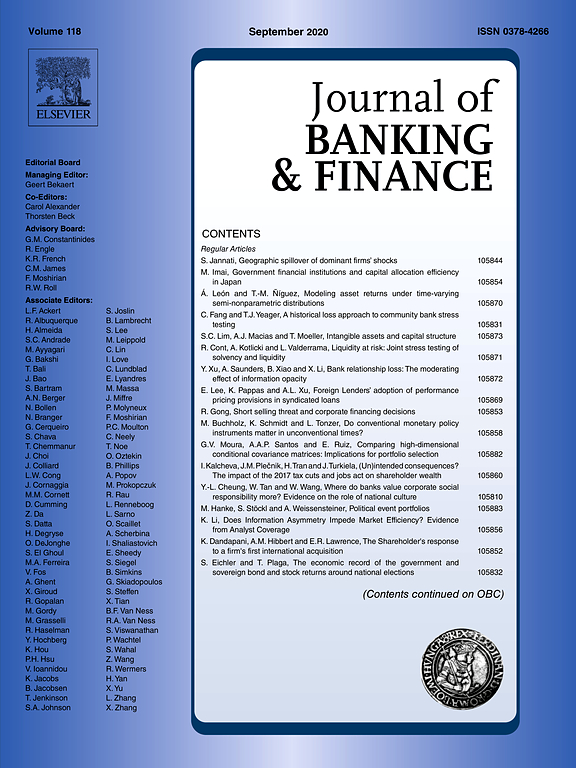
Interactions Between Bank Levies and Corporate Taxes: How is Bank Leverage Affected?
in: Journal of Banking and Finance, Nr. 105874, September 2020
Abstract
Regulatory bank levies set incentives for banks to reduce leverage. At the same time, corporate income taxation makes funding through debt more attractive. In this paper, we explore how regulatory levies affect bank capital structure, depending on corporate income taxation. Based on bank balance sheet data from 2006 to 2014 for a panel of EU-banks, our analysis yields three main results: The introduction of bank levies leads to lower leverage as liabilities become more expensive. This effect is weaker the more elevated corporate income taxes are. In countries charging very high corporate income taxes, the incentives of bank levies to reduce leverage turn insignificant. Thus, bank levies can counteract the debt bias of taxation only partially.

Financial Incentives and Loan Officer Behavior: Multitasking and Allocation of Effort under an Incomplete Contract
in: Journal of Financial and Quantitative Analysis, Nr. 4, 2020
Abstract
We investigate the implications of providing loan officers with a nonlinear compensation structure that rewards loan volume and penalizes poor performance. Using a unique data set provided by a large international commercial bank, we examine the main activities that loan officers perform: loan prospecting, screening, and monitoring. We find that when loan officers are at risk of losing their bonuses, they increase prospecting and monitoring. We further show that loan officers adjust their behavior more toward the end of the month when bonus payments are approaching. These effects are more pronounced for loan officers with longer tenures at the bank.
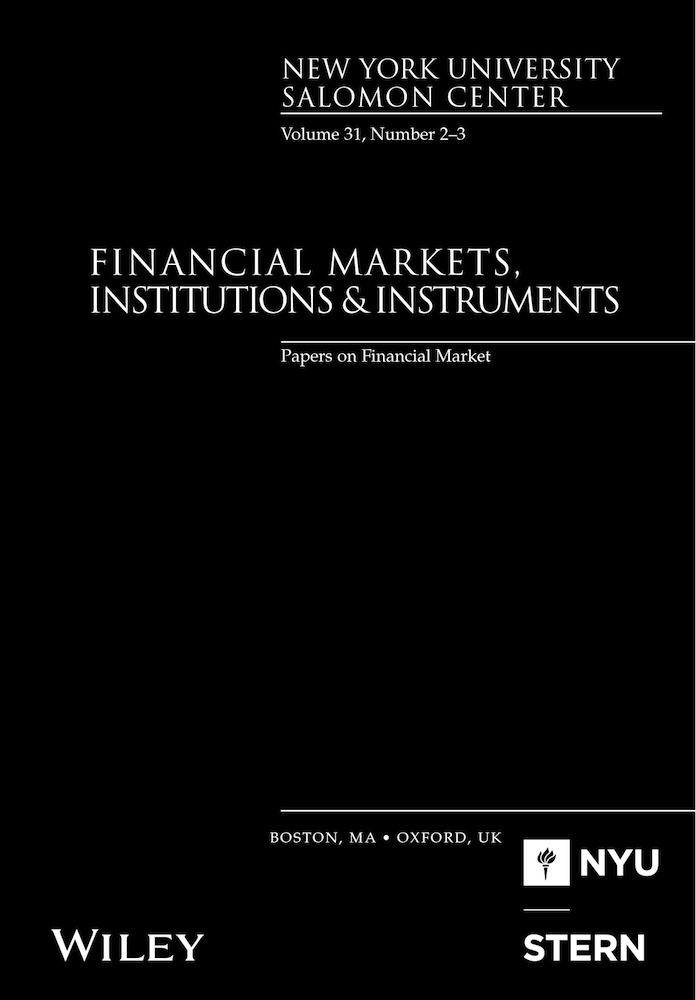
Banks’ Equity Performance and the Term Structure of Interest Rates
in: Financial Markets, Institutions and Instruments, Nr. 2, 2020
Abstract
Using an extensive global sample, this paper investigates the impact of the term structure of interest rates on bank equity returns. Decomposing the yield curve to its three constituents (level, slope and curvature), the paper evaluates the time-varying sensitivity of the bank’s equity returns to these constituents by using a diagonal dynamic conditional correlation multivariate GARCH framework. Evidence reveals that the empirical proxies for the three factors explain the variations in equity returns above and beyond the market-wide effect. More specifically, shocks to the long-term (level) and short-term (slope) factors have a statistically significant impact on equity returns, while those on the medium-term (curvature) factor are less clear-cut. Bank size plays an important role in the sense that exposures are higher for SIFIs and large banks compared to medium and small banks. Moreover, banks exhibit greater sensitivities to all risk factors during the crisis and postcrisis periods compared to the pre-crisis period; though these sensitivities do not differ for market-oriented and bank-oriented financial systems.
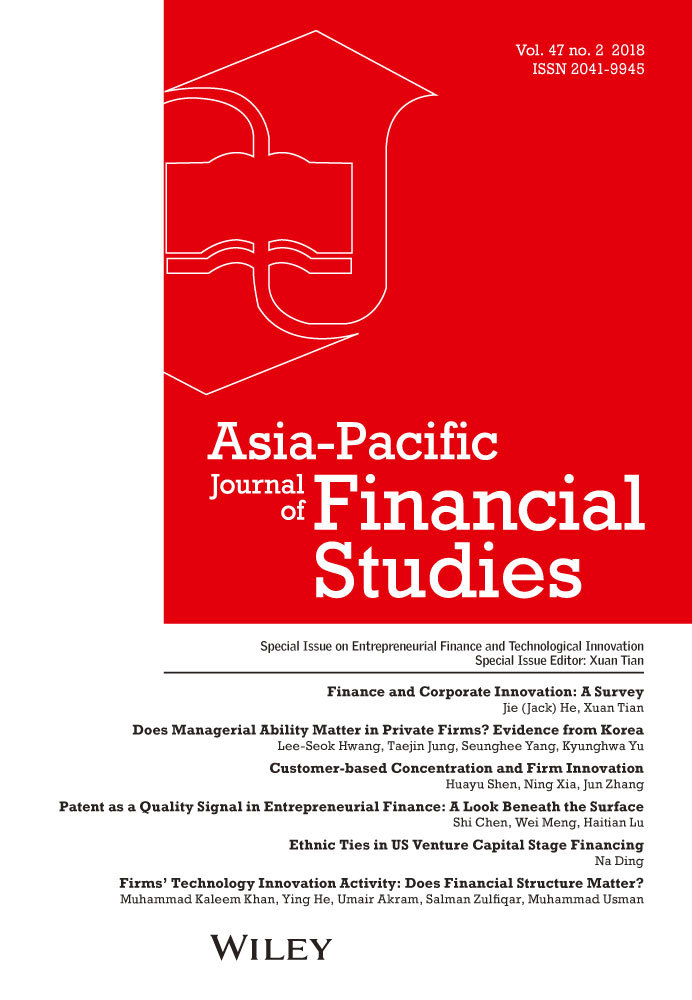
The Dilemma of International Diversification: Evidence from the European Sovereign Debt Crisis
in: Asia-Pacific Journal of Financial Studies, Nr. 2, 2020
Abstract
This paper tests how capital markets value the international diversification of banks in good and in bad economic times by investigating changes in domestic and foreign sovereign debt ratings before and during the European sovereign debt crisis. Tracing 320 European banks in 29 countries and 226 credit rating announcements for European sovereigns between 1 January 2001 and 15 August 2012, we show that the market values banks with access to foreign funds. Despite occasional adverse effects immediately following negative news regarding sovereign credit rating changes, international diversification was found to be beneficial to European banks, especially during periods of distress.

Cross-border Transmission of Emergency Liquidity
in: Journal of Banking and Finance, April 2020
Abstract
We show that emergency liquidity provision by the Federal Reserve transmitted to non-U.S. banking markets. Based on manually collected holding company structures, we identify banks in Germany with access to U.S. facilities. Using detailed interest rate data reported to the German central bank, we compare lending and borrowing rates of banks with and without such access. U.S. liquidity shocks cause a significant decrease in the short-term funding costs of the average German bank with access. This reduction is mitigated for banks with more vulnerable balance sheets prior to the inception of emergency liquidity. We also find a significant pass-through in terms of lower corporate credit rates charged for banks with the lowest pre-crisis leverage, US-dollar funding needs, and liquidity buffers. Spillover effects from U.S. emergency liquidity provision are generally confined to short-term rates.
Arbeitspapiere
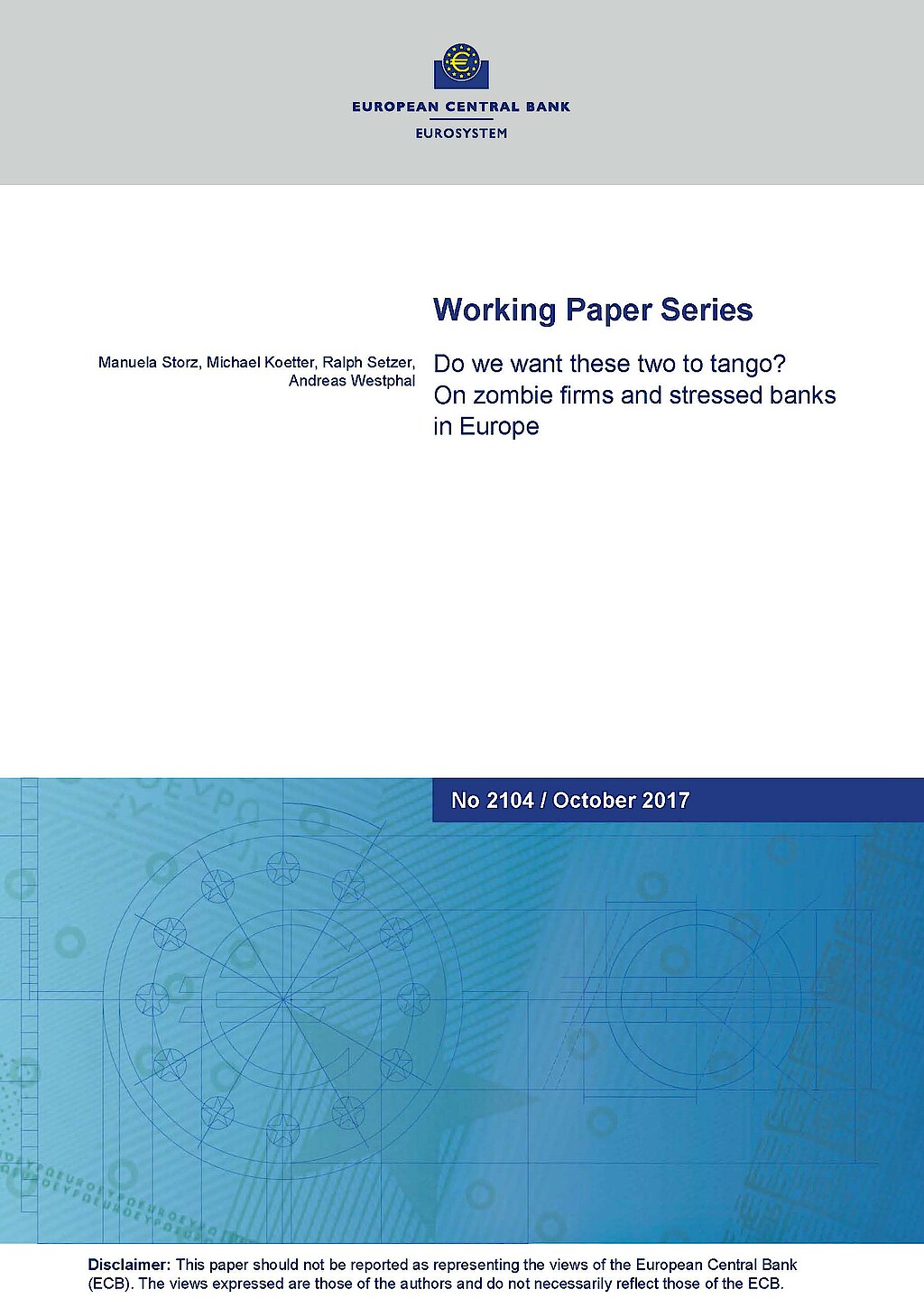
Do We Want These Two to Tango? On Zombie Firms and Stressed Banks in Europe
in: ECB Working Paper, 2017
Abstract
We show that the speed and type of corporate deleveraging depends on the interaction between corporate and financial sector health. Based on granular bank-firm data pertaining to small and medium-sized enterprises (SME) from five stressed and two non-stressed euro area economies, we show that “zombie” firms generally continued to lever up during the 2010–2014 period. Whereas relationships with stressed banks reduce SME leverage on average, we also show that zombie firms that are tied to weak banks in euro area periphery countries increase their indebtedness even further. Sustainable economic recovery therefore requires both: deleveraging of banks and firms.
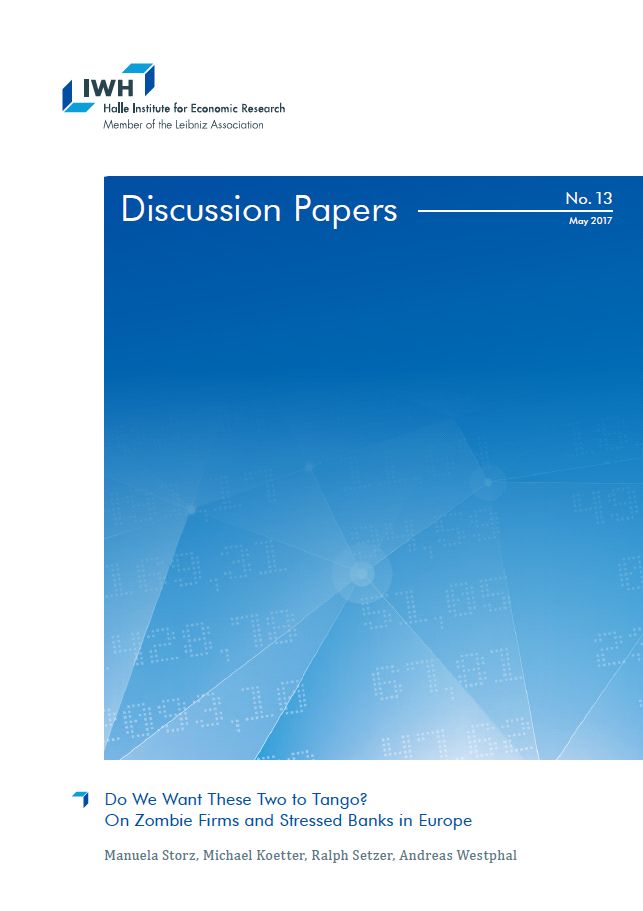
Do We Want These Two to Tango? On Zombie Firms and Stressed Banks in Europe
in: IWH Discussion Papers, Nr. 13, 2017
Abstract
We show that the speed and type of corporate deleveraging depends on the interaction between corporate and financial sector health. Based on granular bank-firm data pertaining to small and medium-sized enterprises (SME) from five stressed and two non-stressed euro area economies, we show that “zombie” firms generally continued to lever up during the 2010–2014 period. Whereas relationships with stressed banks reduce SME leverage on average, we also show that zombie firms that are tied to weak banks in euro area periphery countries increase their indebtedness even further. Sustainable economic recovery therefore requires both: deleveraging of banks and firms.

Inside Asset Purchase Programs: The Effects of Unconventional Policy on Banking Competition
in: ECB Working Paper Series, Nr. 2017, 2017
Abstract
We test if unconventional monetary policy instruments influence the competitive conduct of banks. Between q2:2010 and q1:2012, the ECB absorbed Euro 218 billion worth of government securities from five EMU countries under the Securities Markets Programme (SMP). Using detailed security holdings data at the bank level, we show that banks exposed to this unexpected (loose) policy shock mildly gained local loan and deposit market shares. Shifts in market shares are driven by banks that increased SMP security holdings during the lifetime of the program and that hold the largest relative SMP portfolio shares. Holding other securities from periphery countries that were not part of the SMP amplifies the positive market share responses. Monopolistic rents approximated by Lerner indices are lower for SMP banks, suggesting a role of the SMP to re-distribute market power differentially, but not necessarily banking profits.
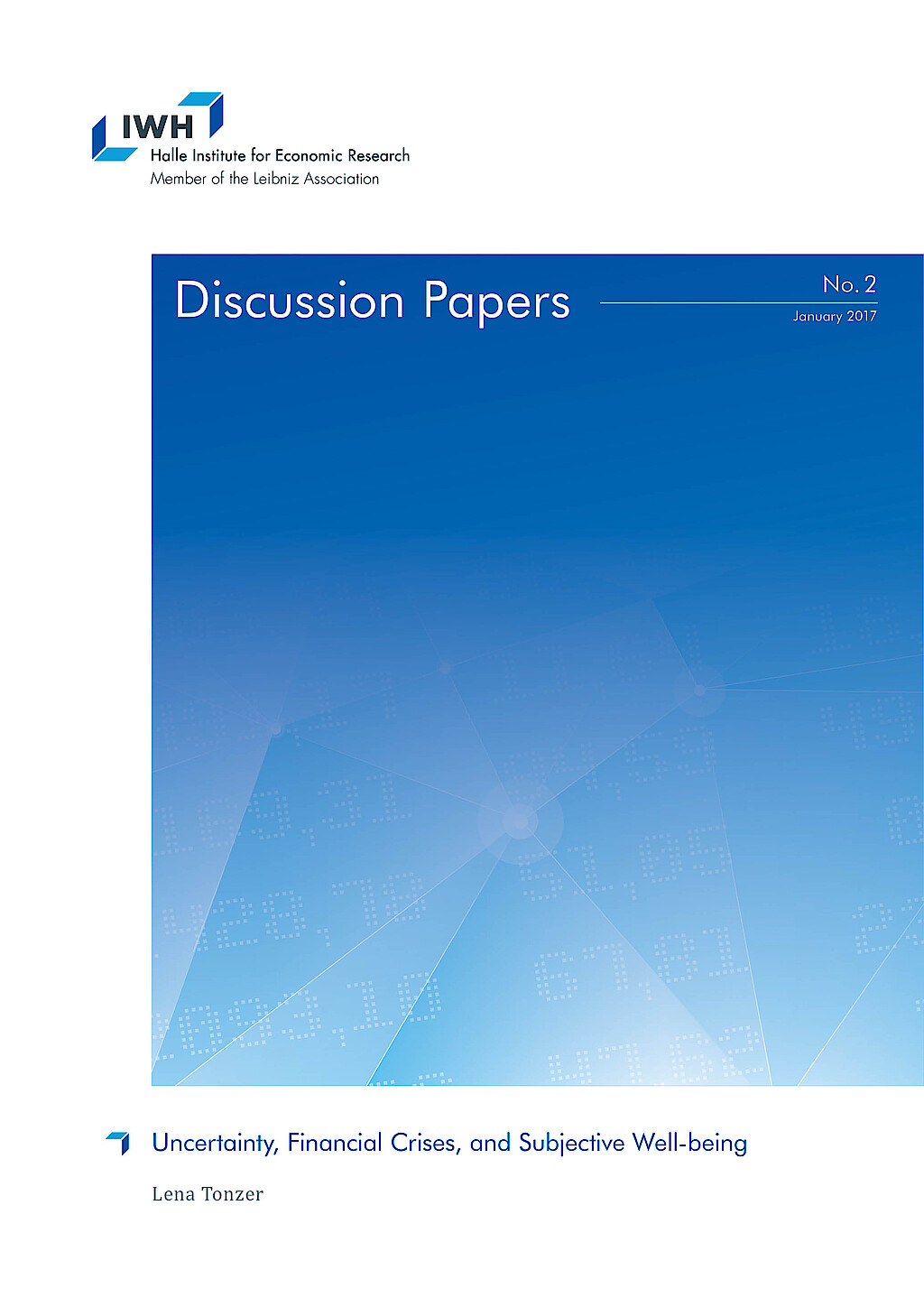
Uncertainty, Financial Crises, and Subjective Well-being
in: IWH Discussion Papers, Nr. 2, 2017
Abstract
This paper focuses on the effect of uncertainty as reflected by financial market variables on subjective well-being. The analysis is based on Eurobarometer surveys, covering 20 countries over the period from 2000 to 2013. Individuals report lower levels of life satisfaction in times of higher uncertainty approximated by stock market volatility. This effect is heterogeneous across respondents: The probability of being unsatisfied is higher for respondents who are older, less educated, and live in one of the GIIPS countries of the euro area. Furthermore, higher uncertainty in combination with a financial crisis increases the probability of reporting low values of life satisfaction.
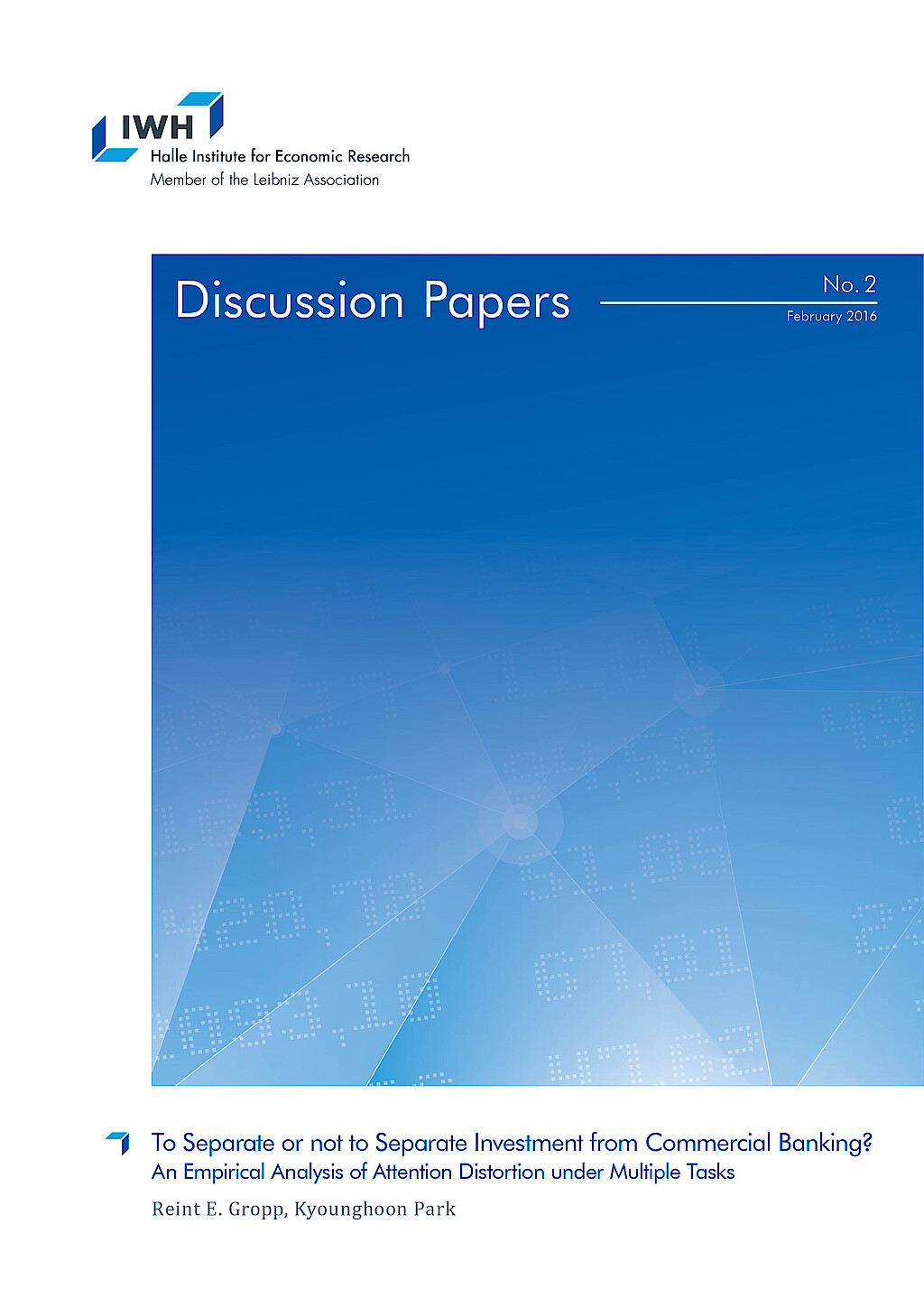
To Separate or not to Separate Investment from Commercial Banking? An Empirical Analysis of Attention Distortion under Multiple Tasks
in: IWH Discussion Papers, Nr. 2, 2016
Abstract
In the wake of the 2008/2009 financial crisis, a number of policy reports (Vickers, Liikanen, Volcker) proposed to separate investment banking from commercial banking to increase financial stability. This paper empirically examines one theoretical justification for these proposals, namely attention distortion under multiple tasks as in Holmstrom and Milgrom (1991). Universal banks can be viewed as combining two different tasks (investment banking and commercial banking) in the same organization. We estimate pay-performance sensitivities for different segments within universal banks and for pure investment and commercial banks. We show that the pay-performance sensitivity is higher in investment banking than in commercial banking, no matter whether it is organized as part of a universal bank or in a separate institution. Next, the paper shows that relative pay-performance sensitivities of investment and commercial banking are negatively related to the quality of the loan portfolio in universal banks. Depending on the specification, we obtain a reduction in problem loans when investment banking is removed from commercial banks of up to 12 percent. We interpret the evidence to imply that the higher pay-performance sensitivity in investment banking directs the attention of managers away from commercial banking within universal banks, consistent with Holmstrom and Milgrom (1991). Separation of investment banking and commercial banking may indeed be associated with a reduction in risk in commercial banking.















